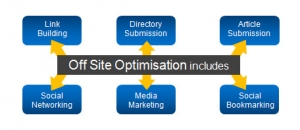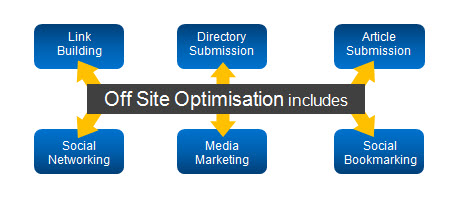What is off page optimization?
 Everyone, at one point in time has looked up certain keywords and key phrases on Google web pages and a few other distinguished search engines. Ever wondered how these pages earn top search engine ranking or even understand from a single keyword or key phrase what it needs to look for?
Everyone, at one point in time has looked up certain keywords and key phrases on Google web pages and a few other distinguished search engines. Ever wondered how these pages earn top search engine ranking or even understand from a single keyword or key phrase what it needs to look for?
This important process of Google ranking system and looking up webpage’s according to keywords and key phrases entered is called On-page SEO. Basic SEO strategies involve the on-page optimization process where every individual web page elements are structured and established. This helps search engines like Google, rank and lookup pages according to the keyword or key phrase entered by the user. These simple SEO techniques allows search engine know of every content there is on a webpage.
Search Optimization Strategy
The process of SEO strategy and Google ranking, which when done right helps increase website traffic involves 6 different on-page optimization components. Most search engine optimization companies are aware of these components. These SEO strategies are used to increase the visibility of web pages in search engines, which also gives rise to the Google rank system. Generally the search engines follow a certain algorithm to look up webpage’s according to the keyword or key phrase entered, and these algorithms have remained constant. Unless these change, the general components needed for internet marketing SEO will continue to remain the same.
Title Tags
Or simply known as content title, it is the most important content in search engine optimization SEO. An ideal content title should be around 60-70 characters, beginning with the main key phrase while the end should hold the branded element. It is important to add unique titles to your content, as it acts as a juicy bite into what the content holds, but should also be different from other similar content on the internet. Unique content will also bring in clicks from your target niche rather than sharing it with your competitors with similar titles.
Meta Tag Optimization
For some, understanding this component could be a bit complicated. However in simple terms, meta tags are nothing but mediators that hold information about your web page and delivers it to every search engine there is. When search engines look up your webpage (also known as crawling) for mini themes, they are in fact coded to look for details on the kind of information your web page holds. Without a meta tag, the search engine will fail to recognize the core of your web page. Meta tag descriptions should therefore be comprehensive which will in turn help search engines understand your page. This is again organic SEO that helps in increasing your web traffic, provided these meta tags are detailed.
On-Page Headings
SEO techniques followed by most companies are simple, they are not interested in mumbo jumbo and web pages that are full of mixed content with no apparent theme to it. What Search engine optimization companies prefer is simple webpage’s that talk about a singular topic, which again forms the main heading of the web page. We are already aware that every body of content and text requires a header that is appropriately highlighted. A short and sweet header that gives enough insight into the material of your webpage should be held within the ‘h1 tag’, which is nothing but syntax needed to code content into webpage’s. The importance of these tags is stupendous, since this is what search engines love looking at. Another criterion of a well highlighted heading is that it should be higher than the body or even introduction of your web page text, but within the web page ‘h1 tag’. Search engine crawlers find it easier accessing your text headers if done so, hence make sure that it also contains the main keyword.
Page Copy
This component is the prime reason for increase in website traffic. Understanding and utilizing this on-page SEO optimization will also earn your website a high Google web page rank. Web site traffic and search engine crawlers are hungry for content and information on the internet. A page copy that is rich in primary as well as secondary keywords and key phrases, along with being unique and informative will earn any web page good visibility irrespective of the search engine. The idea is to create content that is not just tantalizing but has the right mix of richly texted keywords. Although HTML is preferred for search engine optimization, page copy can be news releases, blogs, user generated content and even articles. Adding related videos and images adds to the experience and worthiness of the content.
An ideal page copy would have your primary keywords and key phrases dispersed liberally in the introductory part of your content (which is in the beginning). This allows search engines to decipher the theme/topic that the rest of your web page contains. Again, it is vital that content is unique and not a copy from your competitors website, this will only drain its purpose and that is to increase website traffic.
Search engine optimized SEO pages generally carry a minimum of 150-200 words in a page. If you want your webpage to do even better then settle for 400-600 words per page. The number of words incorporated in your webpage is important as well since it determines your keyword density which in turn also gives appropriate information about your page to every search engine there is.
Page URLs
Until recent times, not much importance was given to a page URL. Now it has become increasingly necessary for URL’s that are search engine friendly which is the best component in on-page SEO optimization. A good SEO strategy in this case would be that you keep your ULR relevant to your content, easy enough for even a novice to remember and as short as possible. A URL with the least dynamic parameters will work wonders towards increasing website traffic. If given a chance to re-write your URL make sure to clean it up as much as possible. Search engines are known to index dynamic URL strings, and at the same time a short enough but descriptive URL will work well with every user.
Anchor Text
The internet would be redundant if there were no links between webpage’s, websites and lots more. If you want your SEO techniques to succeed and at the same time increase web traffic to your webpage, make sure there are enough of rich keyword anchor text that will interlink your site pages. Search engine algorithms use anchor texts to determine Inbound Linking Quality of links on any given page. Obviously this is an important key that helps in Google ranks and other search engine ranks. As mentioned if your webpage enjoys a good set of interlinks you automatically increase website traffic to your webpage. With good number of quality interlinks, internet surfers are automatically directed to your webpage’s and this in turn increases the webpage’s ranks on Google or any other search engine you are familiar with. With dynamic interlinks users can reach parts of your website and make a note of the information they were interested in.



